The Trials and Tribulations of Family-owned Retailers
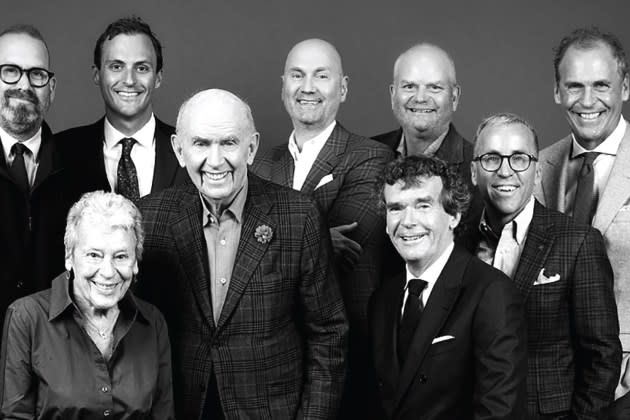
“The first generation starts the business, the second generation grows it, the third generation screws it up and the fourth rebuilds it.”
That was how Hill Stockton, owner and third generation operator of Norman Stockton in Winston-Salem, N.C., described the trajectory of many multigenerational specialty retailers. Although he was half-joking about his own impact on the men’s specialty store that his grandfather started in 1909, his tongue-in-cheek comment nonetheless reflects the challenges many merchants face when seeking to maintain their family’s retail heritage.
More from WWD
Guillermo Andrade Returns to Retail With 424 Flagship on Melrose Place
After the Holiday Rush, Many Retailers Are Cutting Hours Instead of Jobs
It was in 2010 after more than a century in business that Stockton made the decision to close the Norman Stockton store as a result of the recession and heightened promotional environment at the time, which made it nearly impossible for independents to compete.
But retail is in his blood and five years later, Stockton had a change of heart and reopened the family business. And in the fall of 2022, his son Richard Stockton made the decision to join the store, marking the fourth generation of family involvement.
“He has an open mind and a different taste level,” Hill Stockton said of his son. “And he’s bringing in a younger customer.” Hill Stockton recalled that when he first got involved in the family business in the ’80s, he began to bring in popular Italian brands — a decision that didn’t sit well with his father. But he persevered and ultimately “it really helped our business,” he said.
He’s taking that lesson and applying it to Richard’s suggestions on how to update the mix of the store that is a short walk from Wake Forest University. “When younger guys come in, they ask for Richard rather than me,” Hill Stockton said. “They want his opinion.”
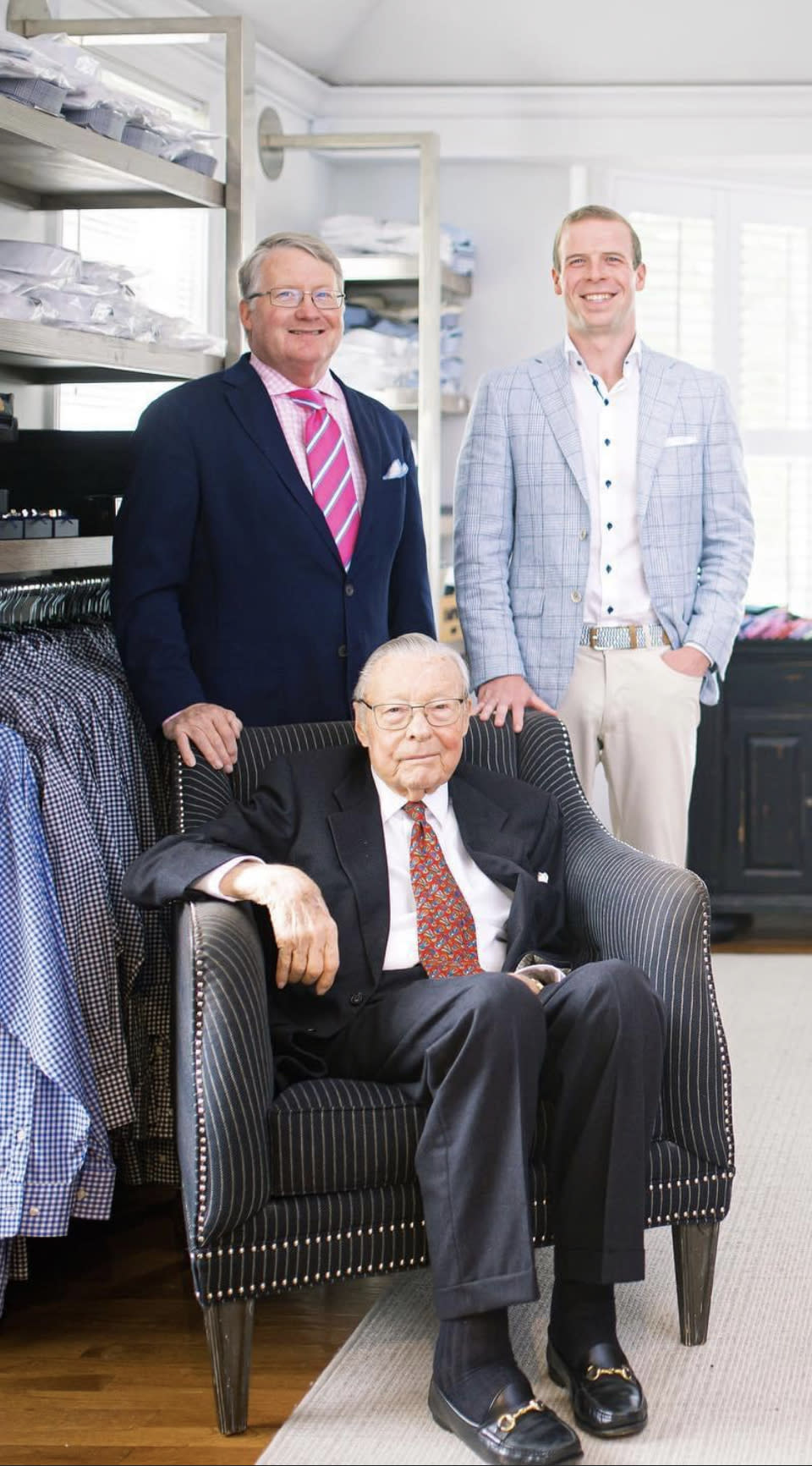
Joining the family business wasn’t a foregone conclusion for Richard Stockton. The 31-year-old had spent five years in medical sales and working for Enterprise Rent-a-Car, where he said he “learned customer service.” But because he had spent his life around retail operations, when he was looking for a career change in 2022, he immediately looked to the family business.
“My dad said, ‘Try it and if it doesn’t work, no hard feelings,’” he recalled. But so far, so good. The younger Stockton has been accompanying his father to trade shows and showroom appointments to get a taste of “what’s cool and new. Trends don’t show up here in Winston first, but we want to keep up.”
At the same time, he will soon turn his attention to the company’s social media and e-commerce presence. “We don’t have an online store right now,” he said, “but we’re in the process of getting one up and running.” He said parents of Wake Forest students will often stop by when they’re in town and he’s hoping to encourage them to continue to shop with Norman Stockton when they get home.
“I don’t have the energy or the background for that,” Hill Stockton admitted. “That’ll be his next big project and it should help our business.”
In addition, having his son involved also means that when he’s ready to step aside, there’s someone to pass the business to. “Hopefully one day I can retire and leave the store in good hands,” Hill Stockton said.
The experience of the Stockton family is not unique. There are many independent stores that boast multigenerational ownership. That includes Canada’s premier chain, Harry Rosen, Philadelphia’s Boyds, New York’s Rothmans, Denver’s Andrisen Morton and countless others. But perhaps the best known and most arguably the most successful family-owned business in the country is the Mitchell Family of Stores.
As the story goes, the chain was founded in 1958 by Ed and Norma Mitchell “with three men’s suits, a coffee pot and a dream” in an 800-square-foot former plumbing supply shop in Westport, Conn. Over the years, the family added several other nameplates to its fold and today, the Mitchell family oversees a retail behemoth with eight luxury stores and annual sales in excess of $200 million. Their reach encompasses both coasts and includes Richards in Greenwich, Conn.; Marios in Seattle and Portland, Ore., and Wilkes Bashford in San Francisco and Palo Alto, Calif.
Bob Mitchell and his brother Russell — grandsons of the founders — serve as co-chief executive officers, and last summer, Bob’s son Lyle took the plunge and came on board, marking the first of the fourth generation to be involved.
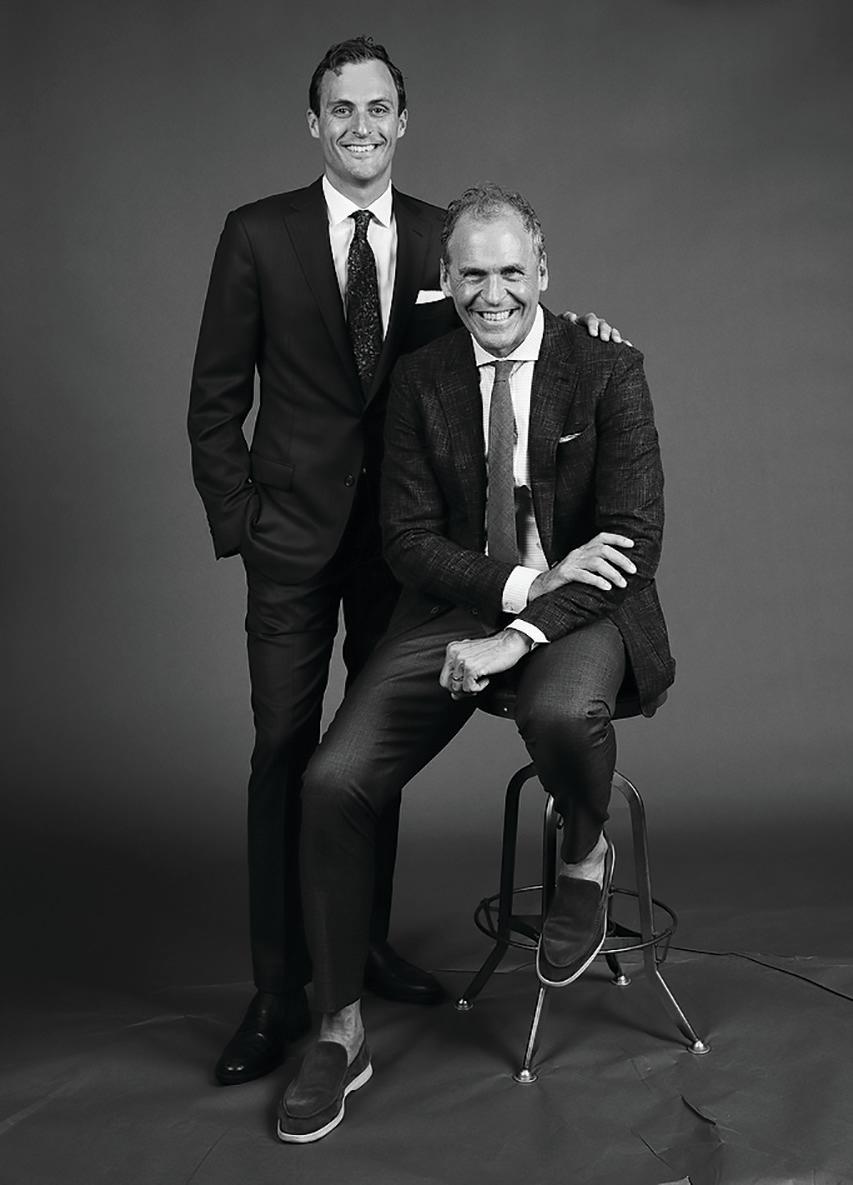
But unlike other retailers who are more seat-of-the-pants about bringing the next generation into the family business, the process at Mitchells is much more formal. As Bob Mitchell explained, anyone interested in joining has to have worked for another business for a minimum of five years — and performed well. He or she has to pass muster in interviews with the company’s board of directors, cannot report to another family member and there has to be an open position, one is not created for the candidate even if their last name is Mitchell. They’re required to work on the floor of one of the stores every Saturday, and the company also employs a family business consultant to offer counsel on how to manage the potential pitfalls of a multigenerational business. “There are clear boundaries,” he said.
To ensure communication among the family members, they hold a meeting every Tuesday and twice a year, the entire clan goes on a retreat. That includes spouses and children over the age of 14 who may or may not be involved in the operation of the business. “That’s the only time it feels like a family, everything else is business first,” Lyle Mitchell said.
In the case of the 29-year-old Lyle, he had worked at an investment bank for two years before joining Tapestry in the finance division. He got his MBA at Columbia Business School and then decided to join Mitchells. “I didn’t anticipate joining the family business right out of business school,” he said. “But I always knew the family business was unique and it became more clear to me that I wanted to get to work with my dad and uncle.”
He acknowledged that working for Mitchells was a bit of an adjustment, but he quickly embraced the trust and common goals evident in a family business. “We’re in it for the long haul,” he said.
Bob Mitchell, who worked at Sports Illustrated before joining the family business in 1991, added: “People like to focus on the negatives of working with family, but there are also the joys. There are a lot more pros than cons and even when things are terrible, you’re all in it together.”
He admits that not everyone always agrees on every decision, but because each family member has a distinct role to play, it works. “When you don’t have strong governance, that’s when the pitfalls happen.”
Although the Mitchell family remains a force within the company, Bob Mitchell pointed out that it is essential to give non-family members the opportunity to be invested in the business as well. The chief men’s merchant, for example, is Dan Farrington who has been with the company for 32 years. “The family can give their opinion on something, but Dan makes the final decision on buying,” Bob Mitchell said.
Lyle is working closely with his uncle setting budgets, figuring out how to make the stores more profitable, increasing efficiency and also pondering what other stores the company may ultimately open or acquire.
Having strong governance such as that exhibited by the Mitchells is important to any family-owned business, said Dan Frosh, a senior adviser at the Cambridge Family Enterprise Group in Massachusetts. Frosh works with businesses in a variety of fields to help families with succession planning, how to pass ownership, how to prepare the next generation to be strong contributors and how best to ensure family unity.
“Those are always the challenges when you’re bringing the next generation in,” he said.
In any multigenerational business, there are two different systems at work — and sometimes they can be at odds. First is the family unit with its unconditional love and support, but what’s the best way to achieve ambitious goals when that is mixed with business? The answer: planning and establishing boundaries, he said.
Whenever a new family member joins, the already-established members first have to ensure they have the necessary qualifications so as to avoid the perception of nepotism, he said, and they need to be intentional on how that person will develop so they establish credibility.
“One of the strengths [of a multigenerational business] is that a lot of family values come into the business,” Frosh said. “But the next generation also has a new way of thinking that can challenge the status quo. So it often works really well until it doesn’t.”
He applauded the Mitchells “more formal” approach, saying it “tends to work better in the long run,” but not every company is willing or able to go down that road. “Most businesses fall somewhere in the middle,” he said.
Another potential pitfall is when the older generation refuses to step aside. Frosh said that with people living longer these days, it often extends the amount of time the next generation has to wait before they can lead. “And sometimes you see an entire generation passed over because by the time the older generation is ready, it’s too late. It’s a real issue.” He recommended that families be open to discussing a reasonable succession plan so that both the older and younger generation understand the timing.
And he also recommended that any family business bring in an “outside perspective” to help them navigate the issues. “Only 13 percent of family businesses make it to the third generation,” he said. “So it makes sense to invest some money in planning and structure rather than waiting for things to explode and then cleaning it up.”
In the case of Rothmans, there were no explosions when Ken Giddon’s son Will joined the New York-based specialty store chain. The business was founded by Harry Rothman in 1926 with a pushcart on the Lower East Side and soon after, became a pioneer in the discount men’s clothing field by buying excess merchandise from manufacturers and selling it at low prices. When Harry passed away in 1985, his grandson, Ken Giddon, was tasked with closing the store.
“It had become an old man’s store — it was outdated,” Giddon said. “I was supposed to go to MIT for business school — before I started selling pants, I was smart,” he said with a laugh, “and my parents asked me to help liquidate it.” But after getting immersed in the business, Giddon realized there were a lot of things he liked about menswear retailing. So after nine months, he reopened.
Five years later, his brother Jim joined him and today, Rothmans operates a flaghip in New York City and two units in Westchester.
The store is no longer a discounter and it now offers far more than just racks of suits — it has become known for introducing new vendors and emerging brands in a wide array of categories.
“We never take ourselves too seriously and we’re always looking at how we should change and evolve,” Giddon said.
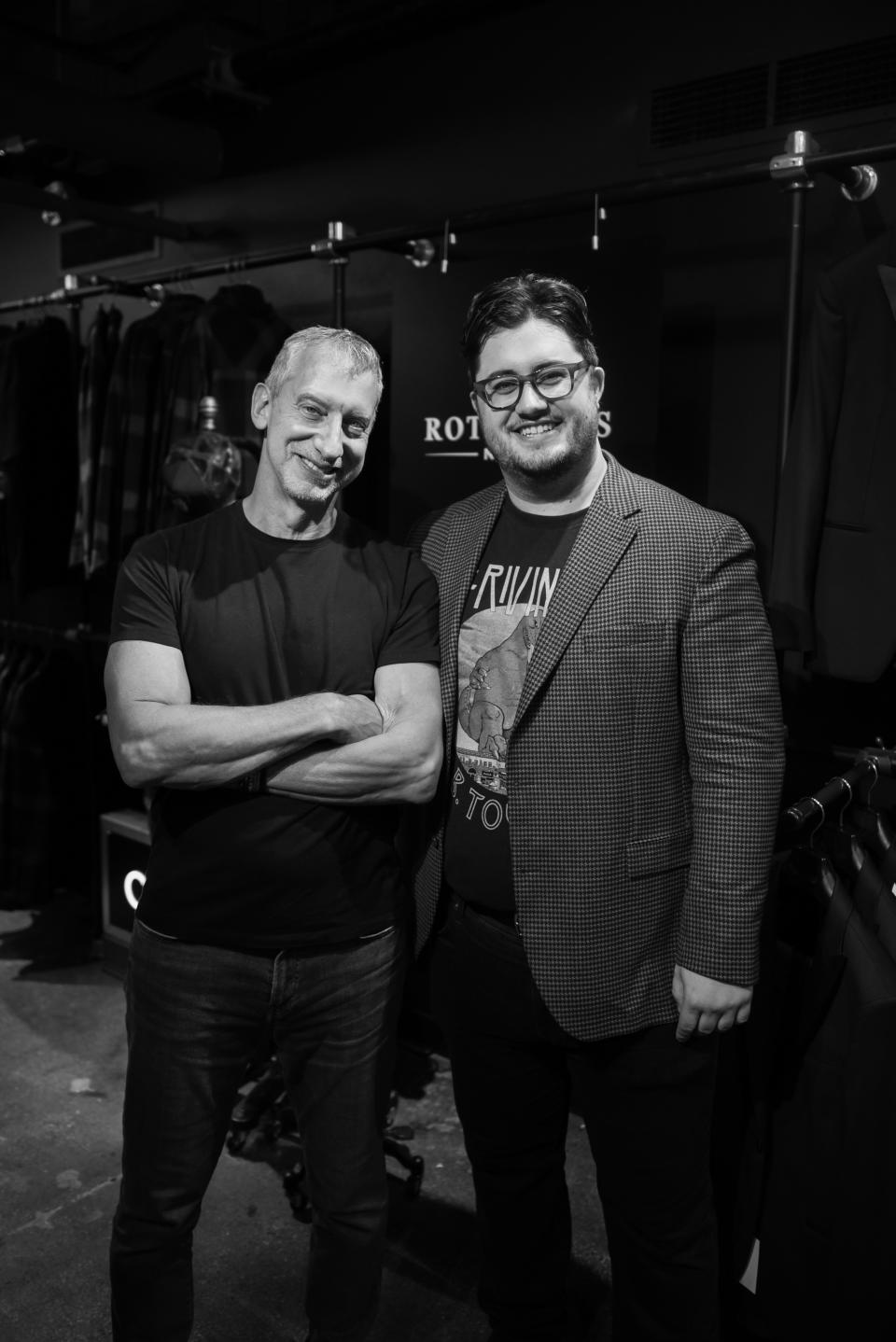
Then three years ago, Ken Giddon’s 26-year-old son Will joined the family business and holds the position of director of business development. Last fall, he spearheaded the opening of a new department at the company’s Union Square flagship called Rothmans Next.
“Will is the fourth generation, but we missed one,” his father said. Before joining the family business, Will Giddon had worked in the entertainment field in Los Angeles for two years but returned home during the pandemic. It was then that he realized that right in front of him was “a rare opportunity — there’s almost 100 years of history and I can be a part of growing it,” the younger Giddon said.
Since it opened, Next, with its assortment of new, less expensive brands, is attracting some younger shoppers, Ken Giddon said, and the shop has led to some positive online reviews as well. Some of the brands introduced at Next have also infiltrated the mix at the larger store. “We’ve gained a lot of insight into where the future of the business is going,” Will Giddon said.
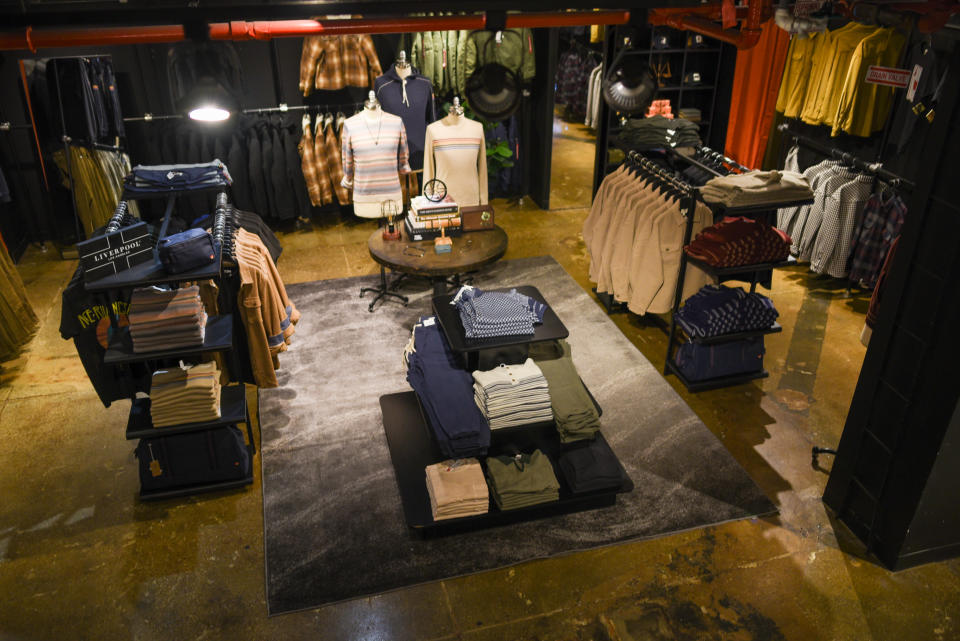
But while Will Giddon’s initial project has met with success, his father and uncle made it clear when he joined that he would be reporting to Rothmans longtime general merchandise manager Lacy McAngus, not them. “He’s overseeing Next, but he still reports to Lacy,” Ken Giddon said. “Just because your last name is Giddon doesn’t mean anything; you have to earn your stripes.”
In addition to finding younger-skewed brands, Will Giddon is also helping Rothmans’ online presence. “I’m pretty savvy but it’s striking the innate ability between someone Will’s age and my age,” Ken Giddon said. “I have the benefit of generational knowhow,” his son said. “I come in with the ability to translate things in a new way.”
Bringing Will on board is also part of the master plan for Rothmans. “I always keep my eye on the future,” Ken Giddon said. “As Wayne Gretzky said, ‘Don’t go where the puck is, go where the puck is going to be.’ And I have a little less of a sense today of where the puck is going to be. No matter how good you are, you can’t replace a younger eye.”
A similar scenario is being played out in Philadelphia at the city’s top luxury store, Boyds, where the fourth generation of the Gushner family has become integral to the business. Boyds was founded in 1938 by Russian immigrants Alexander, Albert and Ben Gushner, who opened a store selling cigars and sundries and eventually men’s shirts, on Market Street. Today, its flagship is located in Center City Philadelphia and it also operates a suburban outpost in Wayne, Pa., that opened in 2022. Kent Gushner, Alexander’s grandson, runs the business and his sons Alex and Andrew are also firmly entrenched, with Alex focusing on men’s merchandising and Andrew on marketing and branding.
Last fall, Andrew was instrumental in creating and executing an extensive campaign to celebrate Boyds’ 85th anniversary, complete with special themed products, events and a special logo.

Andrew Gushner, who was a legal studies major and had worked on the e-commerce team at Bergdorf Goodman, made the decision to join the family business four years ago. “I was keeping the law school option open if I didn’t want to join the business,” he said, but seeing his father’s work ethic and passion for what he did firsthand convinced him to take the leap. “My dad would have supported me if I wanted to be a doctor or a lawyer, but my brother and I are the fourth generation and to end the legacy that my family created would be a shame.”
He admits that being in retail has its share of highs and lows, but he’s proud every day of the choice he made. Looking forward, he’s convinced of the long-term viability of the brick-and-mortar space and believes there’s a possibility to eventually open additional Boyds units somewhere in the immediate vicinity. He also hopes to increase the size of the Wayne store to create a “more serious store in the suburbs.”
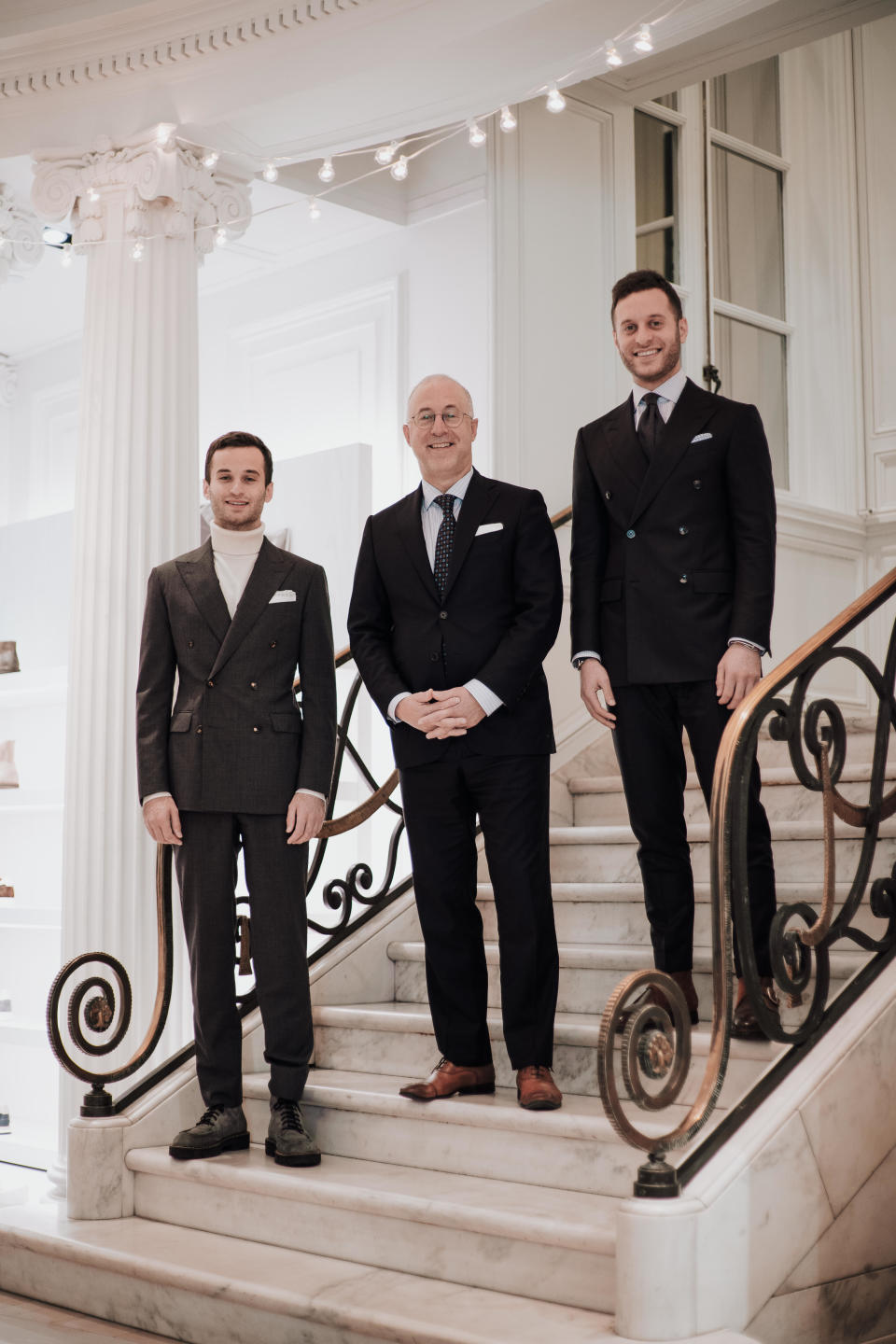
Kent Gushner said he views it as a “blessing” to have both of his sons join him in the business. “Most fathers aren’t lucky enough to have [that opportunity,] particularly when their children grow up and go out into the world. It has always been my dream, my lifetime and career goal, to perpetuate a legacy that means the world to me and is the source of my main inspiration day in and day out. Alex and Andrew’s contributions are multifaceted as they continue to respectfully ‘push the envelope,’ approaching the business through the eyes of their generation, which I believe is imperative for the business to remain relevant in the future. Secondly, their mere presence in the business creates a sense of stability and an eye to the future which provides assurance of stability to the staff which, as I am getting older, might otherwise start to question their career security.”
He said his sons’ “commitment and passion” are “genuine and not something that has to be forced upon them. Having said that, they are still in the earlier stages of working in and learning the business, the uncertainties of life, and…I don’t see myself stepping back for at least the next 10 years, so turning the business over to them is not in the foreseeable future.”
Lindsay Morton Gaiser of Andrisen Morton in Denver has a more exact succession plan. The daughter of cofounder David Morton, she spent much of her formative years at the store. Although she went to college to get a degree as a financial analyst, she never lost her love for the fashion business.
The store was founded in 1979 by David Morton and Craig Andrisen, who met in 1975 when they were both working as salesmen for other stores in the Denver area. They decided to become partners and open their own store, and the decision has paid off.
Like the Mitchells, Andrisen Morton also has a policy where family members have to work elsewhere for five years before joining the business, and for Lindsay, that meant Hugo Boss, Stanley Korshak and Nordstrom. Her first job was at the women’s store as an entry-level salesperson, but when that store closed in 2009, she joined the flagship men’s store, working with Andrisen as a buyer. “I worked under Craig for many years, we have a great relationship — he’s like a second father to me,” she said.

But that will change this year when Andrisen exits the business as part of a seven-year buyout plan that the company had executed. David Morton has already retired and serves more as an adviser. “2024 will be Craig’s last year and my dad and I will own Andrisen Morton together,” she said. “And then Dad will pass the store to me and allow me to take the reins and move it forward.”
What that will include, she said, is an ongoing evolution of the store’s culture. “There’s a reputation in retail that you work seven days a week — there’s no work-life balance,” she said. “I want to make sure we have a family-first culture for our team.” That seems like a bit of a reach for Morton who is active in both the community — where she serves on the board of the Denver Botanic Gardens — and the industry, where she is president of the Forum Group, an elite group of non-competing specialty stores from around the country, including Mitchells, that shares information and advice. “It’s important to be involved in the community and to serve these wonderful stores,” she said.
At Andrisen Morton, she has also spearheaded some changes in the merchandising of the store, moving Zegna to the front and adding a significant in-store shop for Cucinelli. And the store itself was also given a refresh, with new carpeting, revamped restrooms and other updates.
Looking ahead, much like Andrew Gushner of Boyds, Morton is hoping to expand Andrisen Morton’s physical presence. “We’re hoping for more brick-and-mortar growth,” she said. “What we do is really special and I believe we can go into underserved markets and offer the Andrisen Morton experience. That’s a huge 2024 strategy of mine.”
Another long-standing men’s store is Greenville, S.C.-based Rush Wilson Limited. The store was founded by the 23-year-old Rush Wilson in 1950 to introduce natural shoulder New England-style menswear to the Southeast. His son, Rush Wilson 3rd, worked in the store as a teenager, sweeping floors at 13 and selling his first suit at 15. After four years in the U.S. Army, he returned home and joined the family business.
James Rush Wilson 4th, known as Jay, who had worked for seven years for TD Bank, decided to come into the business as well. He joined in 2014 as an executive clothier.
Jay Wilson said after he had worked outside of retail for five years, he and his father had a discussion about whether he still wanted to work in the store, and the answer was yes. It took a while for the store to grow large enough to be able to warrant adding another salary, but when it did, he left the bank and joined. “We needed more help and our business had grown to the point where I could pay him,” Rush Wilson said. Jay worked with the longtime store manager to learn the ropes so he didn’t have to report to his father.
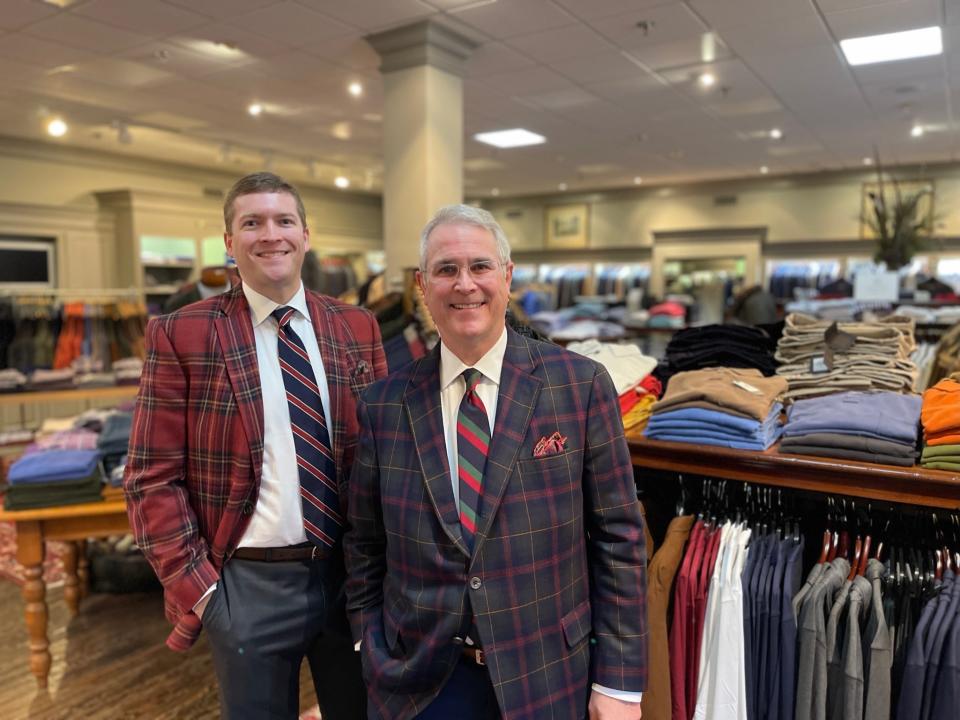
“He’s grown our business a lot,” Rush Wilson said of his son. “He has a great work ethic, he loves people and he knows how to manage. He learned a lot about finance at the bank and a lot of his friends from there have become customers.”
Jay Wilson said he has a few things on his to-do list to continue to evolve the business. He hopes to make some shifts in the physical space to better highlight popular brands, and he is researching how to improve the company’s social media, marketing and email messaging. And with the business getting ready to celebrate its 75th anniversary next year, there are opportunities to highlight its history and legacy that the store intends to embrace.
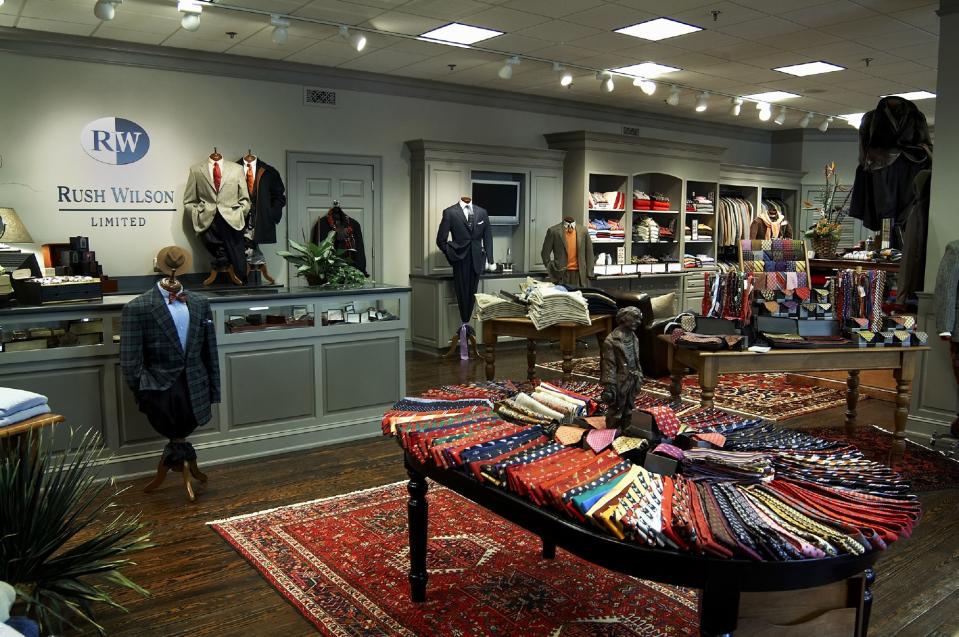
With his son now firmly entrenched in the business, Rush Wilson can also start to think about succession. “He’s the general manager, the buyer and now he’s taking on the financial and accounting area. Once he’s through with that, I’ll be ready to go — but I’ll still keep my eye on things,” Rush Wilson said.
Another third-generation men’s store is McNeil and Reedy in Rutland, Vt. The business was founded in 1956 by James F. McNeil and his friend George Reedy who had worked together in the local department store. Today, the shop is run by twin brothers Jim and John McNeil and Jim’s son Casey is also an integral part of the team.
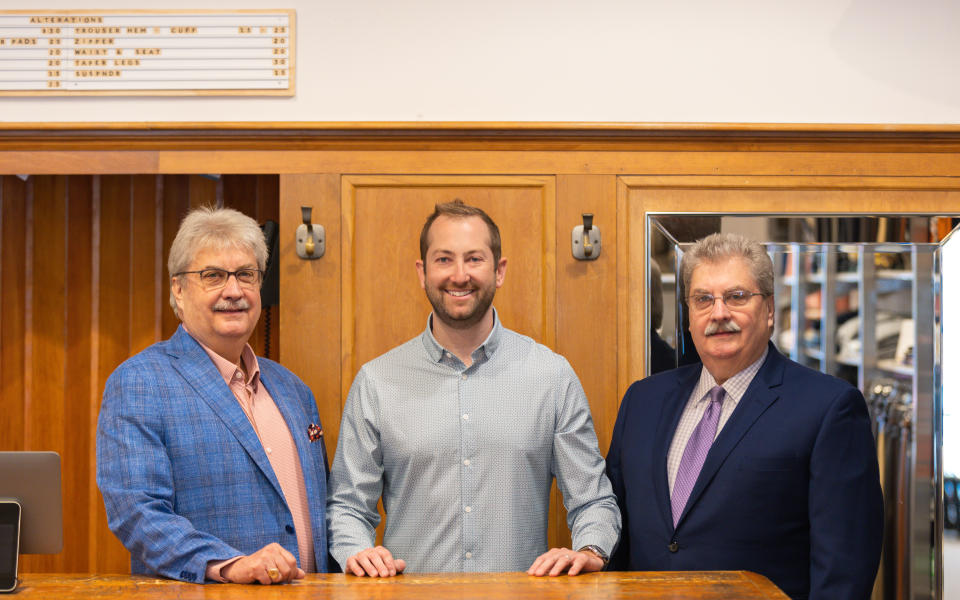
Casey McNeil said he’d been working in the store pretty much his whole life and fit his first suit at the age of 15, without using any measurement tools. Although he earned a degree in finance at college, he decided to return to the family business after the pandemic because he was seeking “a slower pace of life.” Since joining, he has spearheaded modernizing both the store itself, exposing an old tin ceiling that had been covered by cardboard for years, and adding new brands, including some higher-priced labels.
The McNeils took the opportunity to renovate the location while the store was forced to close during the pandemic. “I pitched the idea to my dad and uncle when the doors were closed,” he said. “I felt so passionate that I was ready to self-fund it to see it through.

“We’re staying true to our history but we’ve added a lot of new things such as watches and even maple syrup,” he continued. “We’re in Vermont so how can you not sell maple syrup? We’re here to serve customers.” He has also started hosting events, such as bourbon tastings and roll-your-own-cigar nights to draw customers to the store. Even if they don’t purchase something that night, he said, it serves to introduce the store to potential shoppers and hopefully give them a reason to return.
“I want to bring people out, even if they don’t want to shop,” he said.
He attributed the store’s longevity to superior customer service, a hallmark of most successful men’s stores. McNeil and Reedy is well known for its tailored clothing — it stocks the largest selection of suits, sport coats and tuxedos in the state and continues to have an on-site tailor — but Casey McNeil’s goal is broader than that. “People know to come to us if they need a suit or a tuxedo, but not for a dress shirt or bathing suit. We want to rebrand as a real men’s store.”
And he believes the store’s unique positioning can work outside of Rutland as well. “I want to grow beyond a 30-mile radius,” he said.
In the case of all of these retailers, succession of the family business appears to be ensured thanks to the addition of the younger generation. But what happens when there are no family members to which to pass the torch?
Dana Katz, owner of Miltons, the Store for Men, which operates three stores in Massachusetts, is the grandson of the founder, Isadore Katz, who opened the first location in Quincy, Mass., with his sons Milton and Nathan in 1947.
Although Miltons continues to thrive, Dana Katz said his two children have opted not to join the family business. He said he and his wife took a couple of weeks off this summer and it was an eye-opening experience, since he has rarely left the salesfloor over the course of his career.
So as he ponders the future, he’s exploring options that could work for him as well as the store. “I’m looking to replace myself in a buying capacity and assume a more-senior role,” he said. And ultimately, he could see entrusting Miltons to some of its long-time employees. “I’m very fortunate, I have a great team in place and they think and function like they own the business.”
Best of WWD


